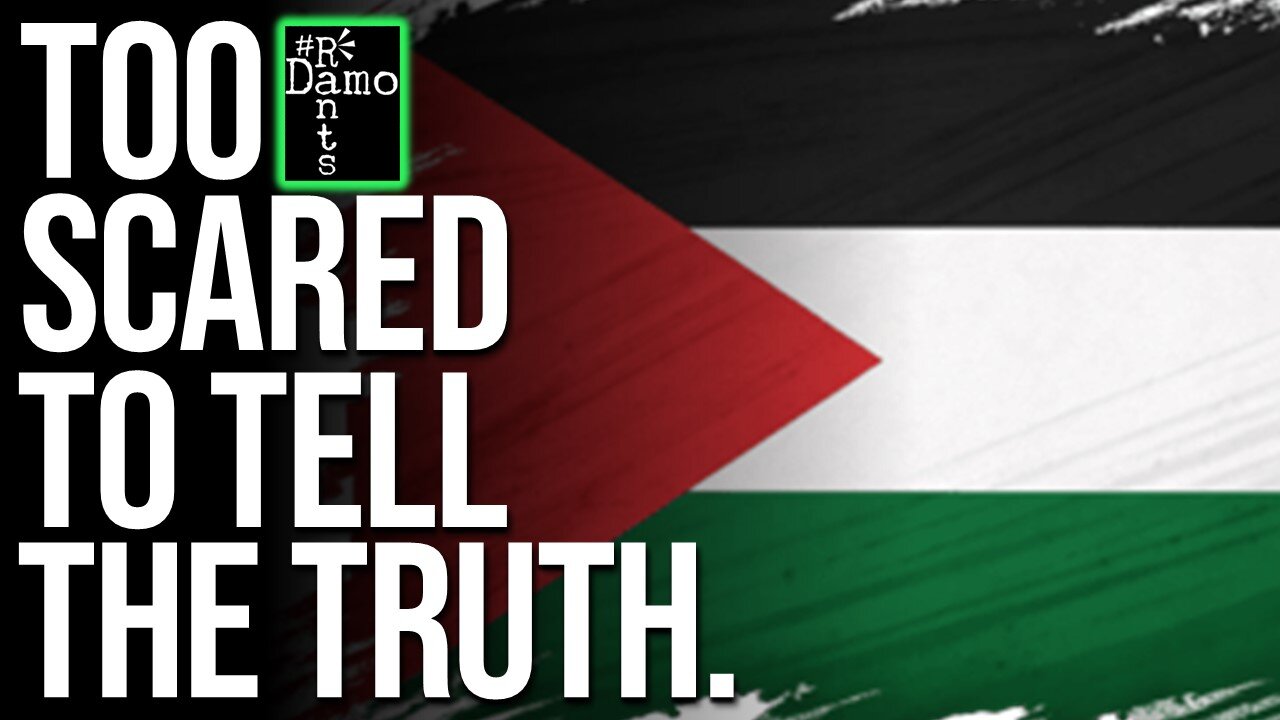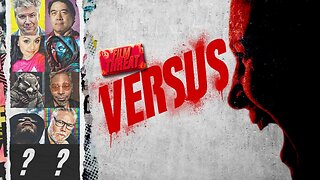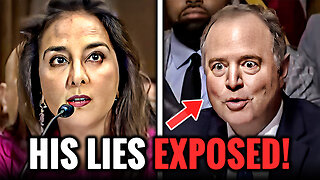Premium Only Content

Channel 4 Just Did What the BBC Was Too Scared To
Right, so the BBC has blown it yet again in a farce of its own design, chucking itself under the bus because its only when they get that low that the Israel Lobby apparently gets off their back, acquiescing to it instead of standing up to it. Once considered the envy of broadcasters worldwide, supposedly the gold standard is journalistic integrity, the BBC now feels more like a risk-averse bureaucracy than the fearless voice of truth it once claimed to be. It prides itself on impartiality, but when it comes to Israel and Palestine, that impartiality often looks suspiciously like cowardice and complicity to the point even the staff are apparently in revolt. In its rush to avoid offending the pro Israel critics who can never be placated, the BBC has found itself in the absurd position of commissioning powerful journalism only to panic and bury it once it gets too close to uncomfortable truths and it has done this not once but twice now, making it all the worse for themselves.
The latest debacle—its cancellation of the documentary Gaza: Doctors Under Attack, a searing exposé of Israel's bombing of healthcare workers—has been the final straw for many and as Channel 4 steps in to broadcast this very film that the BBC decided didn’t meet editorial guidelines, we’re left with an obvious truth now that the BBC has become more afraid of criticism than its commitment to the truth, has it not?
Right, so the BBC, is yet again self owning itself, getting battered entirely justifiably by a growing storm of criticism over its Israel-Gaza coverage, even from within the BBC itself at that. The latest scandal has stemmed from its decision to cancel the airing of what is expected to be a powerful documentary, Gaza: Doctors Under Attack, that the BBC had itself commissioned. The film, is a harrowing exposé of Israel's bombardment of Palestinian healthcare workers and hospitals, but as a result of the BBC’s cowardice it has now been picked up by Channel 4, exposing a gulf in not only editorial courage between the two networks, but how if Channel 4 feels the programme is entirely in keeping with editorial standards why doesn’t the BBC?
The BBC’s mishandling of the Israel-Gaza conflict has now entered an unprecedented phase of scrutiny, both internally and externally. Reports state that BBC staff have revolted over it, audiences have continued to choose to get their news elsewhere as trust in the BBC continues to erode, and mainstream critics have begun to echo what Palestinian advocates have long argued: the BBC has become an apologist for Israeli aggression, adopting language and editorial decisions that sanitise war crimes and marginalise the Palestinian narrative.
This bias has been documented over many years though, it’s not a recent development. During Israel’s last war on Gaza, the so-called Operation Protective Edge in 2014, the BBC received thousands of complaints from the public over what was perceived as one-sided coverage. Protests erupted outside Broadcasting House, with critics accusing the BBC of ignoring the disproportionate civilian toll on Palestinians, more than 2000 people having been killed, 70% of them civilians. Rather than adjusting to the public's demand for balanced journalism, the BBC appears to have retreated further into editorial defensiveness.
When Channel 4 announced that it would be airing Gaza: Doctors Under Attack, set to be broadcast on 2 July at 10pm, it triggered a backlash against the BBC that had already built in the wake of Glastonbury. As many of you will now be aware, the broadcaster found itself in hot water for broadcasting Bob Vylan’s incendiary performance where he called for death to the IDF and is very much standing by that, while simultaneously cancelling the broadcast of Northern Irish rap trio Kneecap’s slot due to the court case alleging support for terrorism as a result of holding a flag up, a charge that the police have now dropped as it happens, as of last night. The BBC's actions reflected not impartiality, but rather a deep discomfort with Palestinian solidarity and a persistent fear of offending Israel or its defenders.
Bob Vylan's on-stage shout of "Death to the IDF" during a charged Glastonbury performance was met with a firestorm of media outrage. Right-wing tabloids called for censure, and pro-Israel organisations accused the BBC of endorsing hate speech. Yet in the aftermath, many pointed out the BBC's hypocrisy: it had previously denied Kneecap a broadcast slot due to fears their anti-Israel message would offend, yet now found itself under fire from the same pressure groups for allowing Bob Vylan's broadcast. The broadcaster's inconsistent decisions suggested not neutrality, but panic-stricken censorship, driven more by political calculation than journalistic judgment.
The documentary in question was produced by Basement Films and had undergone all BBC editorial processes, they had commissioned this investigation. It passed fact-checking, was in line with the BBC’s own broadcasting guidelines, and was ready to air. Yet, it was pulled, with the corporation citing "concerns about impartiality". This, critics argue, was not about fairness or accuracy, but about optics and appeasement.
Internal sources revealed that BBC bosses justified the cancellation by pointing to the controversy surrounding a previous Gaza documentary, Gaza: How to Survive a Warzone, narrated as that was by children, but the BBC ending up getting it in the neck from the Israel Lobby because one of the child narrators happened to be the son of the Hamas Deputy Minister for Agriculture – a politician therefore, Hamas being the legitimate Gaza government after all. Staff were left seething when it emerged that this reasoning was, at best, a smokescreen. The delay and eventual shelving of Doctors Under Attack was not due to editorial shortcomings, because none exists, as I said, it passed all screenings, therefore it can only be due to fear—fear of backlash from pro-Israel lobbyists and their political allies.
The backlash within the BBC has been extraordinary. Journalists have described a "moral crisis" at the heart of the newsroom. Many now believe that senior management is not only out of touch with their editorial mission but actively undermining it. According to Middle East Eye, staff have accused bosses of moral cowardice and warned that the BBC is haemorrhaging credibility.
The BBC’s pro-Israel bias is not just an occasional lapse either, but appears to be a structural issue. A consistent criticism centres on how the broadcaster frames violence in Gaza. Israeli casualties are described with emotional, humanising detail: "a father of three was killed in a Hamas rocket strike." In contrast, Palestinian deaths are often relayed as abstract statistics: "22 people died in an airstrike". As if they suddenly spontaneously combusted or past away from some mysterious means all of a sudden, can’t imagine how it happened. Even the grammar betrays bias—active voice for Israeli deaths, passive voice for Palestinian ones.
Language matters. The BBC refers to Israeli bombing campaigns as "strikes" without acknowledging their human toll, and labels Palestinian resistance as "terrorism" while describing Israeli military action as "defensive". Terms like "occupation", "apartheid", and "genocide" are avoided or even actively censored. Multiple presenters have shut down guests who dare use the word "genocide" to describe the Israeli assault on Gaza, despite growing consensus among human rights experts that the term is appropriate.
This kind of language laundering bears out the BBC’s moral cowardice. The BBC has been repeatedly targeted by powerful pro-Israel lobbying groups such as UK Lawyers for Israel, the Board of Deputies of British Jews, and the Campaign Against Antisemitism. These organisations vigilantly monitor BBC content, branding any criticism of Israeli policy as antisemitic, regardless of context or accuracy. Internal leaks have confirmed that BBC editors have adjusted headlines and pulled content after receiving complaints from such groups or political figures.
Within this climate, the BBC’s decision to shelve a documentary critical of Israel’s war conduct is not seen as isolated but part of a broader pattern of lobbying-driven censorship.
This culture of fear has permeated the institution. It seems to be the case that if they show too much of Gaza, they’re accused of antisemitism and if they don’t, they’re accused of whitewashing genocide and as such the editorial preference is to do nothing and therein lies the BBC's problem: paralysis. Rather than risk criticism, it chooses silence and silence as I keep banging on about on this channel, is complicity.
Palestinian voices are consistently marginalised across BBC programming. When panels discuss Gaza, Israeli spokespeople, Western analysts, and pro-Israel commentators dominate. Palestinian perspectives are tokenised, if included at all. Eyewitness accounts from Gaza are treated with scepticism, while Israeli military statements are reported as fact.
This pattern has pushed audiences away and continues to. Younger, media-literate consumers are abandoning the BBC in droves, turning instead to outlets like Al Jazeera, Democracy Now!, The Intercept, and citizen journalists on platforms across social media. These audiences no longer trust the BBC to provide honest coverage. They see a public broadcaster beholden to power, and more concerned with preserving its reputation than exposing the truth.
The scandal surrounding Gaza: Doctors Under Attack has thrown these contradictions into even sharper relief now though. That Channel 4—a mainstream, regulated broadcaster just like the BBC—is willing to show the film demonstrates that the issue was never about accuracy or impartiality. It was about moral cowardice. Louisa Compton, Channel 4’s Head of News, made this clear when she said that the network had undertaken its own rigorous fact-checking and stood by the film’s editorial integrity. Channel 4, she said, believes in presenting difficult truths, not shying away from them in what is clearly a swipe at the BBC’s cowardice.
This contrast between two major mainstream UK broadcasters is damning. One chooses silence and self-censorship in appeasement; the other chooses truth and transparency and challenges those who will dishonestly and depravedly defend Israel no matter what. The decision shames the BBC more than ever before.
By claiming the film could not be aired due to ongoing reviews of previous content, BBC bosses misled both staff and the public. The documentary was ready, vetted, and broadcastable. It simply made Israel look bad—and that, it seems, is an editorial red line now.
That red line has left the BBC in a full-blown credibility crisis. Staff rebellion over the film’s cancellation is just the latest symptom of a deeper rot. The fallout from Glastonbury, the handling of Kneecap and Bob Vylan, and now the surrender of Gaza: Doctors Under Attack to a rival network, all point to the same conclusion: the BBC no longer knows what it stands for, only that it is running scared of Israel and the self appointed pro Israel censors..
The fact that the BBC does not own the intellectual rights to the documentary—they were retained by Basement Films—allowed the film to find another platform. Channel 4 saw value and urgency in the project. The BBC saw controversy and now they’re paying the price for it.
The contrast is not just editorial; it is moral.
Louisa Compton’s statement that "the risk of appearing biased often comes from avoiding hard truths" speaks volumes about the philosophical gulf that has opened up between two of Britain’s most prominent broadcasters. One believes in journalism as a public duty. The other, increasingly, sees real journalism as a liability to it. Spineless isn’t a big enough word.
This moment could have been a reckoning. Instead, it is a retreat. The BBC had a chance to amplify the voices of doctors risking their lives in Gaza, documenting the horrors of war, and bearing witness to what many humanitarian organisations have called war crimes. Instead, they chose silence, delay, and ultimately abandonment of what I’m sure will be a stellar piece of documentary work
This is a story that will not die even if the BBC wishes it would. Channel 4 will now air the documentary, and audiences will finally see what the BBC tried to suppress. This is a victory not just for journalistic integrity, but for every viewer demanding better and we only have a couple days to wait and see for ourselves.
The BBC has not merely failed in its editorial duty. It has betrayed the very values it claims to represent. It’s decline will only continue as they hide from real news, hide from the work of real journalists in active warzones risking their lives to get the truth out and in fact the biggest failing of the BBC of all in my view is how those brave journalists are failed and the risks they take which have cost so many their lives are silenced by a BBC too afraid to be criticised for doing what it damn well should be.
Of course its not just the BBC who are being consistently shamed for their pro Israel leanings, so is Keir Starmer and its now got so bad for him, he may be facing an ousting, however it is less about Israel and Gaza and more about his mistreatment of the disabled, and a plan to cut cash to them whilst spending big on defence that is not going down well with the UK public. Get all the details of that story in this video recommendation here as your suggested next watch.
Please do also hit like, share and subscribe if you haven’t done so already so as to ensure you don’t miss out on all new daily content as well as spreading the word and helping to support the channel at the same time which is very much appreciated, holding power to account for ordinary working class people and I will hopefully catch you on the next vid. Cheers folks.
-
 LIVE
LIVE
Dr Disrespect
5 hours agoLIVE - DR DISRESPECT - MARVEL RIVALS, PUBG, OFF THE GRID - TRIPLE THREAT GAME CHALLENGE
1,541 watching -
 2:19:15
2:19:15
Tucker Carlson
4 hours agoBill Gates, Truth About Vaccines, & Big Pharma’s Plot to Destroy Doctors Who Question ”The Science”
91.8K89 -
 LIVE
LIVE
Film Threat
17 hours agoVERSUS: CONJURING BOX OFFICE HORROR | Film Threat Versus
104 watching -
 8:32
8:32
Millionaire Mentor
5 hours agoAdam Schiff LOSES IT After Trump’s AG EPICALLY Fires Back
4.8K8 -
 13:47
13:47
Rallied
1 hour ago $0.14 earnedSolo Challenges All Day
7.12K -
 1:11:16
1:11:16
The Quartering
3 hours agoBlack Fatigue Goes Nuclear, Baseball Karen Destroyed, Illegals At Hyundai & More!
77.8K71 -
 LIVE
LIVE
StoneMountain64
3 hours agoDelta Force Budget vs JUICER Loadouts
110 watching -
 LIVE
LIVE
Radiancevideography
8 hours ago $4.55 earnedAMHR Nationals 2025 (Day #5) Ford Arena 9/8/2025
426 watching -
 1:47:05
1:47:05
Russell Brand
5 hours agoEstablishment ATTACK RFK Jr As China Unveils Weapons AIMED at America’s Bases! - SF629
118K25 -
 1:11:52
1:11:52
Jeff Ahern
2 hours ago $0.49 earnedMonday Madness with Jeff Ahern
11.2K1